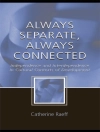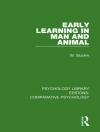The International Handbook of Psychology is an authoritative resource covering all the main areas of psychological science and written by an outstanding set of authors from around the world.
The 31 chapters cover not only scientific but also applied cross-disciplinary aspects. Supervised by an International Editorial Advisory Board (IEAB) of 13 eminent psychologists and edited by Professors Kurt Pawlik and Mark R Rosenzweig, it is being published under the auspices of the International Union of Psychological Science (IUPsy S) by SAGE Publications Ltd in London.
The International Handbook of Psychology will be invaluable to advanced undergraduates, graduate students and academics in psychology, and will also be of interest to students of education, sociology, political science, humanities, philosophy, informatics, cognitive sciences, neuroscience, legal sciences and criminology, and will serve as a general resource reference text, written at a level comparable to Scientific American.
`This impressive volume covers a tremendous amount of work. It is well organized: authors have generally kept to a standard brief. It is also truly international both in authorship and the origin of the work referenced. This will provide a very useful reference book for undergraduate and post-graduate students′ – British Journal of Educational Psychology
表中的内容
PART A: FOUNDATIONS AND METHODS OF PSYCHOLOGY
Chapter 1: Psychological Science – Kurt Pawlik University of Hamburg, Germany and Mark R Rosenzweig University of California, Berkeley, CA, USA
Content, Methodology, History and Profession
Chapter 2: Basic Methods of Psychological Science – William K Estes Indiana University, Bloomington, IN, USA
Chapter 3: Behavior in the Social Context – Vera Hoorens University of Leuven, Belgium and Ype H Poortinga Tilburg University, Tilburg, The Netherlands
Chapter 4: Psychology in Biological Perspective – Mark R Rosenzweig University of California, Berkeley, CA, USA and Keng Chen Liang National Taiwan University, Taipei, Taiwan, China
PART B: INFORMATION PROCESSING AND HUMAN BEHAVIOR
Chapter 5: Sensation/Perception, Information Processing, Attention – Gery d′Ydewalle University of Leuven, Belgium
Chapter 6: Conditioning and Experimental Analysis of Behavior – Ruben Ardila, University of Colombia, Bogot[ac]a, Colombia
Chapter 7: Memory Processes – Henry L Roediger and Michelle L Meade both at Washington University, St Louis, MO, USA
Chapter 8: Neurobiology of Learning – Federico Bermudez-Rattoni and Martha Escobar both at Universidad Nacional Autónoma de México, México City, México
Chapter 9: Psychology of Language – Pim Levelt Max-Planck Institute, Nijmegen, The Netherlands
Chapter 10: Knowledge Acquisition and Use in Higher-Order Cognition – Giyoo Hatano Keio University, Tokyo, Japan and Kayoko Inagaki College of Education, Chiba University, Japan
Chapter 11: Motivation – Peter M Gollwitzer and Juan Delius both at University of Konstanz, Germany and Gabriele Oettingen Max Planck Institute for Human Development, Berlin, Germany
Chapter 12: Emotion – Nico H Frijda University of Amsterdam, The Netherlands
Chapter 13: Consciousness and Conscious Experience – Carlo Umilt[gr]a University of Padova, Italy
PART C: SOCIAL PROCESSES AND BEHAVIORAL DEVELOPMENT
Chapter 14: Developmental Psychology I – Heidi Keller University of Osnabr ck, Germany
Pre-Natal to Adolescence
Chapter 15: Developmental Psychology II – Lea Pulkkinen University of Jyväskylä, Finland
From Adolescence to Old Age
Chapter 16: Personality and Individual Differences – Robert T Hogan University of Tulsa, OK, USA, David Lubinski Vanderbilt University, Nashville, TN, USA and Allan R Harkness University of Tulsa, OK, USA
Chapter 17: Social Processes and Human Behavior – Michael A Hogg University of Queensland, Brisbane, Australia
Social Psychology
Chapter 18: (Cross)-Cultural Psychology – Cigdem Kagitsibasi Koc University, Istanbul, Turkey
Chapter 19: Comparative-Evolutionary Psychology – Michael Corballis University of Auckland, New Zealand and Stephen E G Lea University of Exeter, UK
PART D: APPLIED PSYCHOLOGICAL SCIENCE
Chapter 20: Psychological Assessment and Testing – Kurt Pawlik University of Hamburg, Germany, Houcan Zhang Beijing Normal University , China, Pierre Vrignaud INETOP/CNAM, Paris, France, Vladimir Roussalov Russian Academy of Sciences, Moscow, Russia and Rocio Fernandez-Ballesteros Universidad Autónoma de
Chapter 21: Clinical Psychology I – Kenneth J Sher and Tim Trull both at University of Missouri, Columbia, MO, USA
Psychological Disorders: Description, Epidemiology, Etiology, and Prevention
Chapter 22: Clinical Psychology II – Peter E Nathan, Anne Helene Skinstad and Sara L Dolan all at University of Iowa, Iowa City, IA, USA
Psychological Treatments: Research and Practice
Chapter 23: Health Psychology – Ralf Schwarzer Free University, Berlin, Germany and Benicio Guti[ac]errez-Do[ti]na San Jose, University of Costa Rica, Costa Rica
Chapter 24: Psychology in Education and Instruction – Robert L Burden University of Exeter, UK
Chapter 25: Work and Organizational Psychology – Pieter Drenth Free University, Amsterdam, The Netherlands and Wang Zhong Ming Hangzhou University, China
Chapter 26: Applied Social Psychology – Jos[ac]e Prieto Complutense University of Madrid, Spain, Michel Sabourin University of Montreal, Canada, Lenore Walker Nova Southeastern University, Fort Lauderdale, FL, USA, Ignacio Aragon[ac]es Complutense University of Madrid, Spain and Maria Amerigo U
Chapter 27: Contributions of Psychology to Peace and Non-Violent Conflict Resolution – Michael Wessells, Randolph-Macon College, Ashland, VA, USA
Chapter 28: Psychology as a Profession – Ingrid Lunt Institute of Education, London, UK
PART E: PSYCHOLOGY IN TRANS-DISCIPLINARY CONTEXTS
Chapter 29: Theoretical Psychology – Hank Stam University of Calgary, Canada
Chapter 30: International Psychology – Qicheng Jing Chinese Academy of Sciences, Beijing, China
Chapter 31: Psychological Science in Cross-Disciplinary Contexts – Michel Denis LIMSI-CNRS, Paris, France












